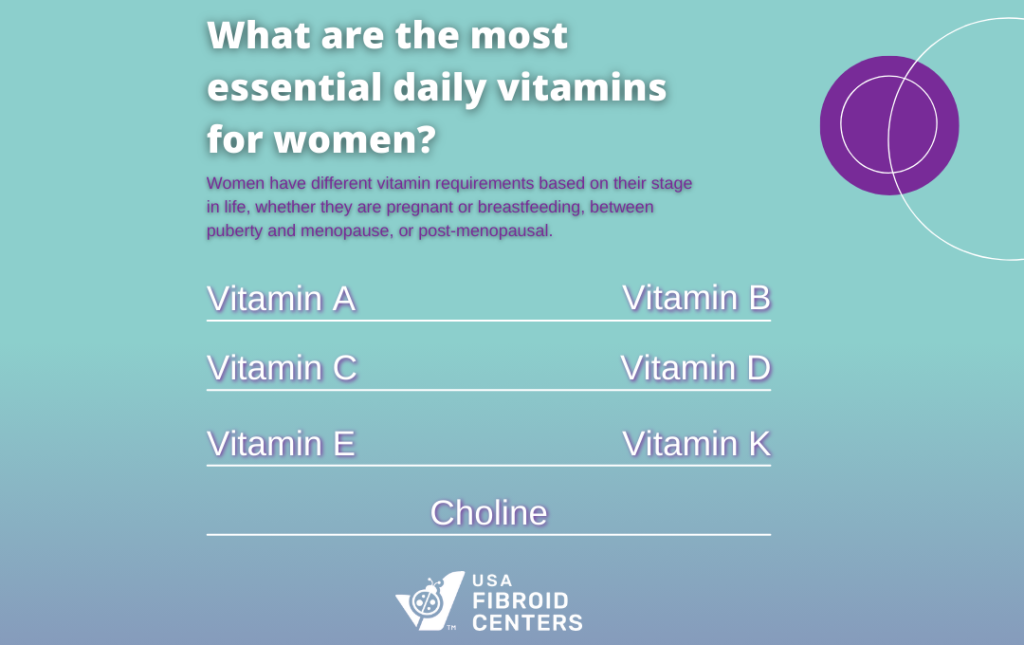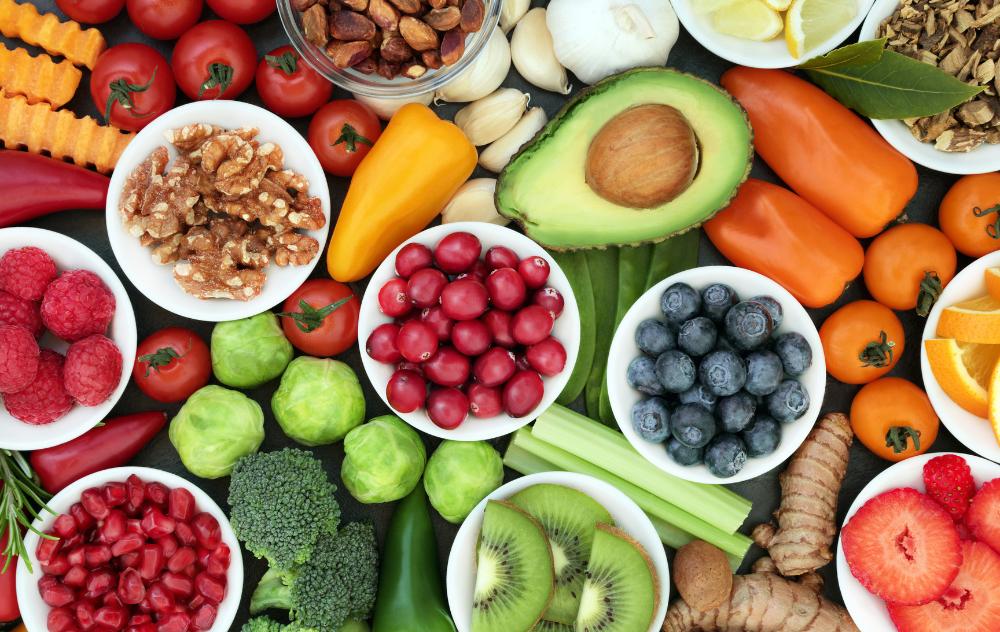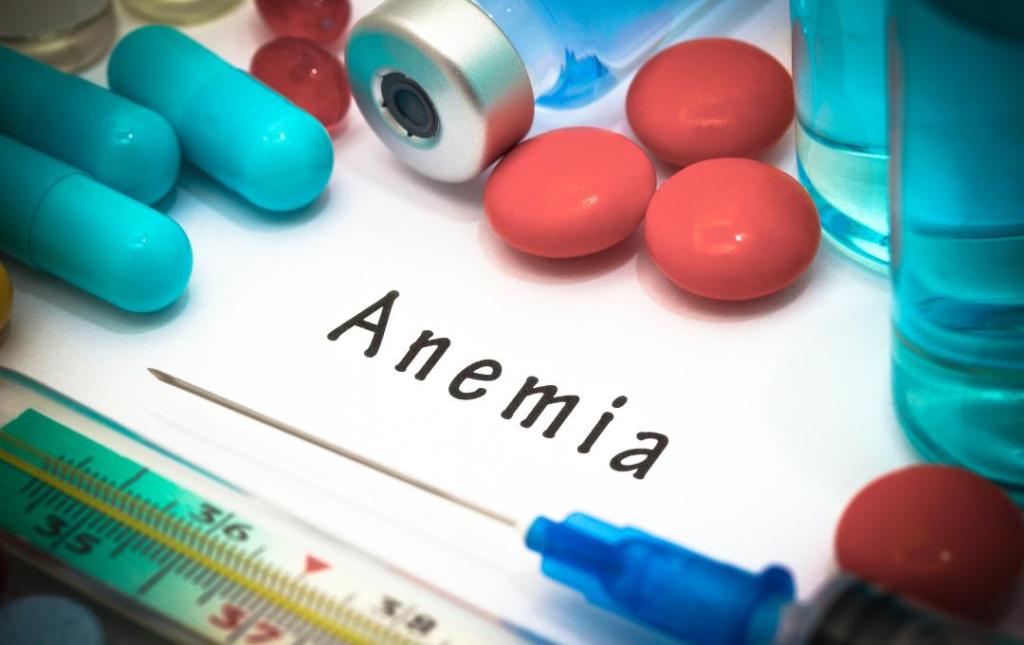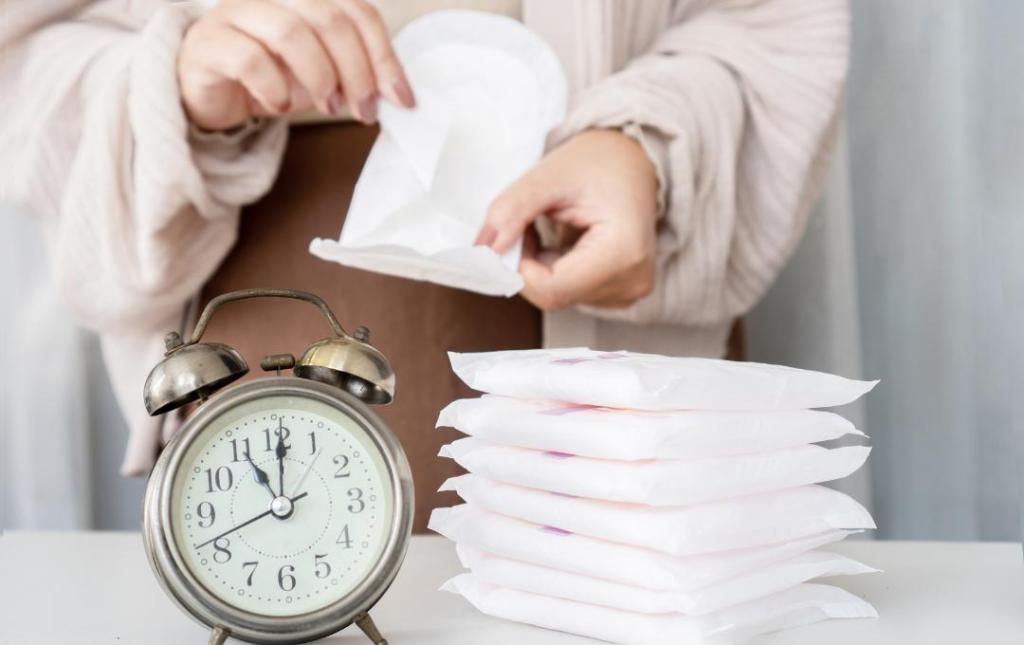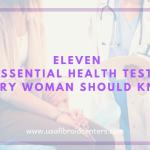
Important Vitamins For Women with Fibroids
Women’s bodies have unique nutritional needs throughout life, from puberty to menopause, or post-menopausal.
While a healthy, balanced diet can provide most of the vitamins women need, some individuals may still benefit from supplementation. This is because our bodies can’t produce all the essential nutrients, and even with a balanced diet, factors like individual needs, absorption rates, and dietary choices can impact vitamin intake. Regardless of whether you primarily obtain vitamins through food or supplements, understanding the recommended vitamins for women’s health remains crucial.
What Are Women’s Most Essential Daily Vitamins?
Vitamins and minerals are vital for various bodily functions, from cell growth and energy production to immunity and bone health. While a balanced diet is often ideal, some women may benefit from supplements to bridge nutrient gaps.
Women’s bodies rely on specific vitamins for various functions, from cell growth to energy production to immunity and bone health. While a balanced diet is often ideal, regular checkups can help ensure optimal vitamin levels and identify any deficiencies.
The Power of Vitamins
Some women may benefit from supplements to bridge nutrient gaps, but individual needs vary, so consult your doctor to tailor your vitamin intake and avoid overconsumption. The following list of vitamins is imperative for the body to function properly daily, especially for women:
Vitamin A
While Vitamin A is known for its benefits to clear vision, it’s also important for fetal development. This vitamin can help with cellular growth and a healthy immune system.
B Vitamins
There are several B Vitamins, but some are more important to women than others.
- Vitamin B9, also known as folic acid, is essential for helping your body make blood cells. It also prevents certain birth defects and reduces the risk of premature births.
- Vitamin B12 also helps the body make red blood cells. It is responsible for helping the neurons in the brain to work as they should. This is another vitamin that is important for pregnant women to take to avoid a low birth weight.
- Vitamins B1 and B2 are important for energy. Vitamin B7, also known as biotin, helps with energy and regulates oxidative stress. Pregnant women are more likely to suffer a deficiency.
Vitamin C
Vitamin C is most popular for strengthening your immune system, but it does much more. This vitamin helps with wound healing and making more red blood cells. Vitamin C also makes you feel more alert and able to concentrate better by boosting the chemical in the brain called norepinephrine.
Vitamin D
Vitamin D is necessary to help you get the most benefit from calcium. It moves the mineral into your bloodstream. If you don’t get enough Vitamin D, your body will take the calcium from your bones, which can cause them to become weak and brittle.
Vitamin E
Vitamin E helps slow the signs of aging by keeping your cells healthy. It’s also necessary for immune health. It’s rare to experience a deficiency, but women who have trouble absorbing fat may become deficient.
Vitamin K
Vitamin K is important in helping blood to clot. It also assists other nutrients in keeping your bones strong, which is important as you get older, especially for women.
Choline
Choline is a necessary nutrient for pregnant women for their health and the baby’s. Women are recommended to get 450 mg daily, but many prenatal vitamins don’t include choline.
Vitamins for Fibroids
Women with fibroids or those who are at risk may want to think about their nutrition and how it can help with this condition. Iron and B vitamins are important for a woman with uterine fibroids, especially if they cause severe bleeding. If you suffer from extended periods or heavy bleeding during your period, you may need extra iron or vitamin B.
Vitamin D deficiency may increase a woman’s risk for the growth of fibroids. You can get this vitamin from plants and through foods sourced from animals, such as eggs, milk, cheese, honey, and meat. While you may be unable to prevent fibroids through what you eat, getting the right nutrition to counteract some of the symptoms is important to be as healthy as possible.
What Vitamins Are Important When You’re On Your Period?
Calcium: Cheese, yogurt, beans, and figs – Relieve bloating & sleepiness.
Fish Oil: Salmon, Omega-3 supplements – Ease headaches, nausea, and fatigue.
Folic Acid: Leafy greens and legumes – May regulate periods.
Magnesium: Dark chocolate, avocados, nuts, seeds, and whole grains- Combat insomnia, breast tenderness, and anxiety.
Iron: Spinach, lentils, eggs, broccoli, chicken, and pumpkin seeds – Fight symptoms of heavy bleeding.
Vitamins for Anemia
You may be wondering what vitamins have to do with anemia. It’s called anemia, when your body doesn’t have enough red blood cells to carry oxygen from the lungs to the rest of the body. Anemia also describes a shortage of iron-rich protein called Hemoglobin (Hb). You may experience iron deficiency anemia as your body attempts to use your iron stores to make more hemoglobin that can carry oxygen to supply to various body cells.
In this process, your iron store levels may deplete to the point that you may suffer from iron-deficient anemia. Vitamins for anemia, such as Fe, also known as iron, can combat this storage depletion. Choosing foods that are rich in iron is one of the best ways to improve your overall levels.
Can Your Period Cause Anemia?
Heavy bleeding caused by fibroids can drain your iron stores, leading to a common condition called iron deficiency anemia.
Your doctor can be your partner in tackling both concerns. They’ll help you manage your fibroids, reduce your risk of anemia, or replenish your iron reserves if you’ve already experienced heavy bleeding.
If you experience heavy periods due to fibroids, you may be at risk for iron deficiency anemia, a condition where your body lacks enough iron to produce healthy red blood cells. This can leave you feeling fatigued, breathless, and sluggish. Iron deficiency anemia from fibroids is treatable.
Long or heavy, prolonged periods or bleeding between menstrual cycles could signal iron-deficiency anemia. While normal periods last two to eight days, anything beyond 10 days or bleeding between cycles warrants a doctor’s visit. Uterine fibroids can also contribute to heavy bleeding, which may lead to anemia. This can cause fatigue, drowsiness, and other symptoms If you’re experiencing heavy bleeding or unusual fatigue, talk to your doctor about anemia and potential treatment options. Early detection and treatment of anemia are key to feeling your best.
Mild anemia is usually asymptomatic and most patients don’t even know they have it. Symptoms will start to set in when red blood cells reduce in number as a result of the anemia progresses. Since red blood cells are responsible for delivering oxygen to the body, when there aren’t enough red blood cells there isn’t enough oxygen for all the cells in our body.
The red flag of anemia during menstruation can manifest in several ways that disrupt your daily life. Fatigue may weigh you down, leaving you feeling weak and breathless. Your skin might appear pale, a stark contrast to your usual vibrancy. Headaches and dizziness can cloud your focus, while irregular heartbeats add a layer of anxiety. These symptoms, physical and emotional, can paint a picture of struggle, making it crucial to seek help.
How To Treat Anemia Caused By Uterine Fibroids
Uterine fibroid embolization (UFE) is a minimally invasive same-day procedure that treats fibroids so they no longer cause heavy bleeding. The remainder of the uterus and the ovaries are unaffected, but the fibroids are treated from the inside, cutting off their blood supply to solve the problem completely. Within a few weeks of the procedure, the period will normalize and will have a much lighter blood flow. Without heavy bleeding, the body’s natural processes for manufacturing red blood cells are able to reverse the anemia, and the red blood cell levels will return to normal within a month or two. At this time, any anemic symptoms will fade away and no further iron supplementation will be needed.
Visit USA Fibroid Centers
If you’re experiencing symptoms associated with uterine fibroids and/or anemia, contact us today at 855.615.2555. Our fibroid specialists are passionate about helping their patients live healthy, happy, symptom-free lives.
Sources:
- OASH. (February 2021). Vitamins and minerals for women.
- Healthline (February 2021) Should women take supplements? Sources and dietary needs.

